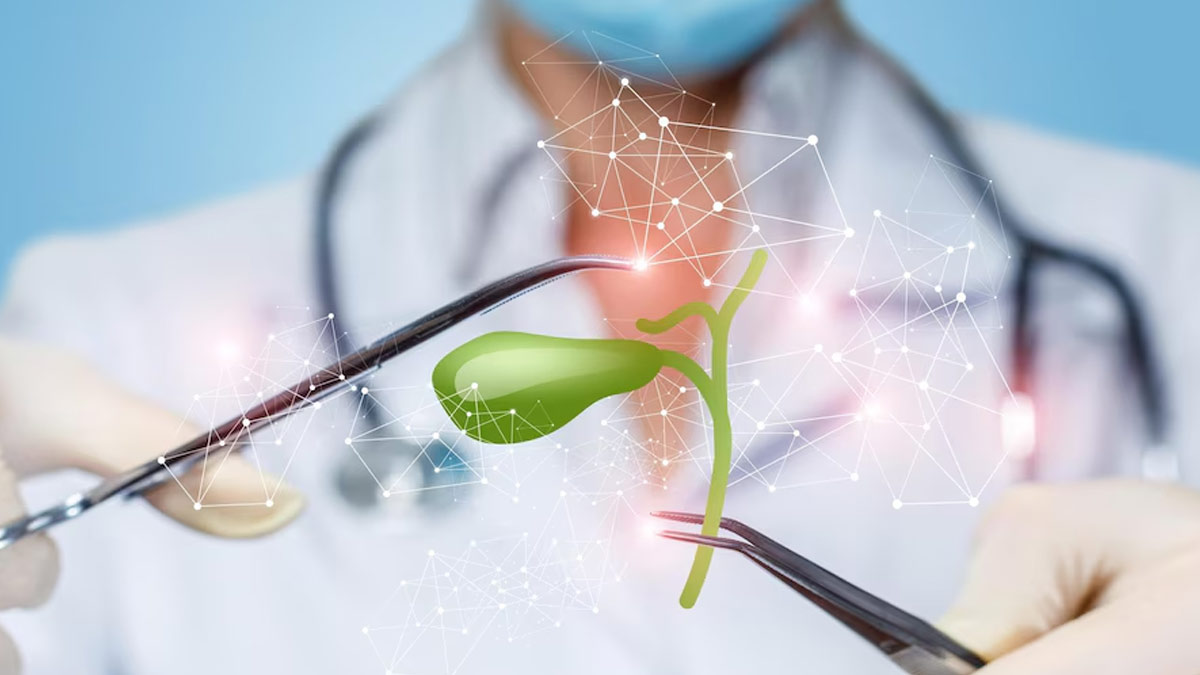
The gallbladder is a tiny sac located under the liver that stores and thickens the bile produced by the liver. Bile is a yellow-green fluid that aids in digestion by breaking down fats from the food you eat.
One of the most common complications related to the gallbladder is gallstones, which are hard deposits made of excess bile materials. If left untreated, gallstones can lead to gallbladder inflammation, also known as cholecystitis. Cholecystitis is usually treated in the hospital with fasting, intravenous fluids, antibiotics, and pain relief medication.
Managing gallbladder inflammation also requires a proper diet with strict limitations on high-fat foods, as recommended by most experts.
Also Read: Gallbladder Problems: Things You Need To Know
Causes Of Gallbladder Inflammation

Gallbladder inflammation, or cholecystitis, is caused by blockage of the cystic duct, which prevents bile from flowing out, according to StatPearls Publishing. This blockage can be due to various factors, such as gallstones or other causes, including:
- Tumour
- Infection, such as AIDS
- Severe illness that damages blood vessels and restricts blood flow to the gallbladder
Research notes that about 95% of people with acute cholecystitis have gallstones.
Foods To Eat

The diet plays a crucial role in managing gallbladder inflammation. While it doesn't directly cause gallbladder problems, eating healthy does reduce the risk and also provides relief if you're already suffering from them.
Let’s take a look at some of the foods you should consume, especially if you have gallbladder inflammation:
- Fresh fruits and vegetables like apples, berries, spinach, kale, and carrots
- Lean proteins, such as skinless poultry, fish, tofu, and beans
- Whole grains like brown rice, quinoa, oats, whole wheat bread, and barley
- Healthy fats, such as olive oil, avocado, nuts, seeds, and fatty fish
- Low-fat dairy products include fat-free (skim) yoghurt, cottage cheese, or milk.
Foods To Avoid

Research suggests that pain associated with gallbladder inflammation can be exacerbated by fatty food intake, accompanied by symptoms like nausea, occasional vomiting, increased bloating, and flatulence. Therefore, some of the foods that should be avoided completely include:
- High-fat foods like fried foods, fast food, fatty meats, full-fat dairy, and butter
- Refined carbohydrates like white bread, pastries, sugary cereals, white rice, and sweets
- Processed foods like processed meats, pre-packaged snacks, frozen meals, instant noodles, and canned soups
- Sugary drinks, such as sodas, sweetened teas, energy drinks, fruit punches, and milkshakes
- Spicy and acidic foods like hot peppers, spicy sauces, vinegar-based foods, excess citrus, and tomato products
Also Read: Gallstone: High Risk Groups, Diagnosis And Prevention Tips For Gallstones
Who Should Be More Mindful?
While anyone can develop gallbladder problems and diseases, there are certain groups of people who may be more at risk. The five Fs are a mnemonic device healthcare providers use to assess people's risk for gallbladder disease, according to the Cleveland Clinic. The five Fs are:
- Fair
- Female
- Fat
- Fertile
- Forty (40)
This suggests that non-Hispanic white females over the age of 40 who are obese and have one or more children may be more at risk of developing gallstone disease.
Conclusion
Gallbladder inflammation can become serious if not treated on time. It can also worsen because of an unhealthy diet, which usually consists of a high-fat diet. Avoid fatty foods, refined carbohydrates, processed meals, sugary drinks, and spicy or acidic ingredients, and opt for low-fat options like fruits, vegetables, lean proteins, and whole grains, which can ease gallbladder strain and promote better digestion. In addition, talk to your doctor or a registered dietitian for a personalised plan to maintain gallbladder health.
Read Next
Renuka Shahane Recalls Getting Her Periods At 10; At What Age Do Most Girls Get Their First Period?
How we keep this article up to date:
We work with experts and keep a close eye on the latest in health and wellness. Whenever there is a new research or helpful information, we update our articles with accurate and useful advice.
Current Version